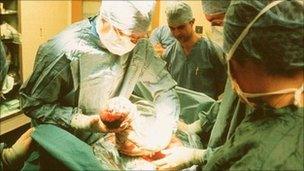Women can choose Caesarean birth
- Published
- comments

Pregnant women who ask for a Caesarean delivery should be allowed to have the operation, even if there is no medical need, according to new guidelines for England and Wales.
The National Institute of Health and Clinical Excellence (NICE) states that women should be offered counselling and told of the risks first.
Ultimately, however, the decision would be made by the mother-to-be, it said.
NICE said this was "a very long way" from offering all women surgery.
The last set of NICE guidelines, which were published in 2004, clearly stated that "maternal request is not on its own an indication for Caesarean section" and that clinicians could decline the procedure "in the absence of an identifiable reason".
The rules on requesting a C-section have been revised. Clinicians say this is to bring the instructions into line with what is already taking place in hospitals.
Birth fear
The 2011 guidelines say that women requesting a C-section because of anxiety should be offered mental health support. A phobia of childbirth is thought to affect 6% to 10% of women.
Nina Khazaezadeh, a consultant midwife at St Thomas' Hospital, says she often meets patients who want a Caesarean due to a "perceived lack of control, fears of inadequate care provision and lack of support during labour and delivery".
"But, after a discussion of all the pros and cons of both types of birth, and having been assured of one-to-one midwifery support and an individualised birth plan, they will choose to try for a vaginal birth."
The updated guidelines state that if such women still wanted a C-section, they should get one.
Women with no medical need can also ask for a Caesarean section. The guidance states that they should be told of the risks and discuss their request with a clinician, but their request cannot be denied.
Malcolm Griffiths, a consultant obstetrician and gynaecologist who led the development of the guidelines, said: "Caesarean section is a major operation, it's about as major as a hysterectomy.
NICE's Gillian Leng outlines new guidelines on Caesarian births
"It's not a major operation that most pregnant women are interested in or want to have."
Dr Gillian Leng, deputy chief executive of NICE, said: "This guideline is not about offering free Caesareans for all on the NHS.
"It is about ensuring that women give birth in the way that is most appropriate for them and their babies.
"Offering these women a planned Caesarean section in these circumstances is a very long way from saying that Caesarean section should automatically be offered to every woman."
New rules
There will be wider changes to clinical practice.
Being HIV positive will no longer be treated as grounds for an automatic C-section. Improvements in anti-retroviral therapies mean it is now safe for some woman with HIV to deliver vaginally.
There will also be changes to break the mentality of "once a Caesarean, always a Caesarean".
The latest evidence suggests that even for women who had up to four previous C-sections, that the risks of fever, bladder injuries and surgical injuries were the same for planned vaginal and planned Caesarean deliveries.
Also it had been thought that giving women antibiotics to protect against infection during surgery could be damaging to the baby. NICE says medical evidence says this is not the case and that women should now be given antibiotics before going under the knife.
In the UK, about one in four births is by Caesarean section. The rate has been roughly static for the past four years following years of increases. Across Europe figures vary widely from about 14% in Nordic countries to 40% in Italy.
NICE believes that overall, the rate could fall after the introduction of the new guidelines.
Wendy Savage, a retired professor of obstetrics, said women requesting a C-section were not responsible for the rise rather "it is obstetricians that are too keen to do it".
On vaginal births she said: "They don't know how to do it most of them now because they haven't been trained how to do it.
"It is up to us to put our house in order and stop doing Caesareans too easily.
"We're doing too many first Caesars and secondly we're doing too few vaginal births after Caesarean section."
Cathy Warwick from the Royal College of Midwives: 'It doesn't differ from the current practice going on in many maternity units'
The changes will come at a cost to the NHS of around £0.5m, largely from the cost of mental health services for women with anxiety.
The cost of a planned Caesarean section was estimated at £2,369, with a planned vaginal birth costing £1,665.
Maureen Treadwell, co-founder of the Birth Trauma Association, said: "We are delighted that this updated guideline recognises the terrible impact that fear of childbirth can have on women and their families."
Cathy Warwick, chief executive of the Royal College of Midwives, said: "If midwives are able to help women to understand what their choices mean for them and their baby and feel they will be supported in labour then very few women will want an elective Caesarean section.
"They will be making decisions from a fully informed position and from a position of trust in maternity services, not one based simply on hearsay."
- Published23 November 2011
- Published6 September 2011
- Published31 August 2011
- Published25 February 2011